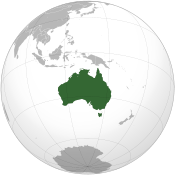Australian government concedes the federal budget may be forced into deficit
Wednesday, November 26, 2008

Image: djackmanson.
Australian Prime Minister Kevin Rudd has told the House of Representatives that the federal budget may need to fall into "temporary deficit" if the global economic crisis impacts upon Australia further. The Prime Minister said it would draw upon its budget surplus to stimulate growth and jobs.
The Prime Minister said the Australian economy had changed significantly over the past few months and warned that there were hard times to come for many people. Mr Rudd said the situation will worsen before it gets any better.
Mr Rudd said that the government will go into temporary deficit and spend on infrastructure to stimulate growth if required and not to do so would be irresponsible.
"If Australian economic growth slows further because of a further deepening of the global crisis then it follows that Australian Government revenues will reduce further," he said.
"Under those circumstances, it would be responsible to draw further from the surplus and if necessary to use a temporary deficit to begin investing in future infrastructure needs including hospitals, schools, TAFEs, universities, ports, roads, urban rail and high speed broadband." He added, "Such action would support growth would support families and jobs and would be undertaken in the national interest."
If the budget fell into deficit, it would be first time the federal budget has gone into deficit since 2001. Previously, the government has refused to concede the budget would go into deficit, contrary to predictions by economists.
The admission by the government follows claims on the weekend by the Prime Minister that he did not expect the budget would go into deficit "in the current circumstances." Today Mr Rudd told parliament that the global economic crisis is accelerating.
"The world economy is deteriorating rapidly," Mr Rudd told parliament.
"The impact of the global financial crisis ... has grown from a trickle to a flood. It is now sweeping across the world from China to Chile, from Germany to Japan."
The government slashed its budget surplus forecast earlier this month by AUD15 billion to $5.1 billion and revised down revenue for the next four years by a further $40 billion. Mr Rudd blamed part of the downgrade to falling commodity prices.
Figures recently released by the OECD predict that Australia will manage to avoid a recession this year; economic growth is predicted to be 1.7%.
Opposition leader Malcolm Turnbull used the Prime Minister's announcement to attack the Rudd government's economic credentials. He said any deficit would be regarded by voters to be a failure in economic management.
Mr Turnbull asserted that it is unlikely that any deficit would be temporary. "Experience and history tell us that Labor deficits are never temporary," he told parliament. "The last Labor deficit lasted for six years. It only came to an end with the election of a coalition government."
Mr Turnbull said the government had remained focused on inflation for longer than they should have.
"It was the only government in the developed world that was ignoring the global financial crisis...and was declaring its own war on inflation, when much darker storm clouds were on the horizon."
The Liberal leader took aim at comments made by Finance Minister Lindsay Tanner and Prime Minister Rudd on the weekend that said the budget would not be allowed to fall into deficit.
"Forty-eight hours [later] and that has been completely abandoned," said Turnbull.
Sources
- Samantha Maiden. "Budget may fall into deficit: Rudd" — The Australian, November 26, 2008
- Emma Rodgers. "Budget may be forced into deficit: Rudd" — Australian Broadcasting Corporation, November 26, 2008
- "Rudd admits deficit is a chance" — The Age, November 26, 2008

